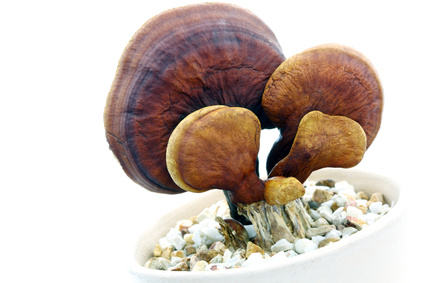History of Medicinal Mushrooms
 Mycotherapy deals with the use of the valuable ingredients of medicinal mushrooms in order to treat different illnesses. This has been explored in numerous studies. The tradition to use medicinal mushrooms as a medicine has already existed for a long time. In Egypt the pharaohs knew the reishi mushroom (see picture). In China 4.000 years ago the Traditional Chinese Medicine used mushrooms to treat various symptoms. In the 12th century Hildegard von Bingen and doctor Paracelsus in the 15th century knew the benefits of medicinal mushrooms. In 1928 in London, Alexander Flemming discovered that penicillin from molds could stop the growth of bacteria. In the past decades mainly the U.S. and Korea analyzed the ingredients and effects of medicinal mushrooms. In Germany medicinal mushrooms are legally sold as dietary supplement and can be bought from various companies, as they obtain no toxic substances.
Mycotherapy deals with the use of the valuable ingredients of medicinal mushrooms in order to treat different illnesses. This has been explored in numerous studies. The tradition to use medicinal mushrooms as a medicine has already existed for a long time. In Egypt the pharaohs knew the reishi mushroom (see picture). In China 4.000 years ago the Traditional Chinese Medicine used mushrooms to treat various symptoms. In the 12th century Hildegard von Bingen and doctor Paracelsus in the 15th century knew the benefits of medicinal mushrooms. In 1928 in London, Alexander Flemming discovered that penicillin from molds could stop the growth of bacteria. In the past decades mainly the U.S. and Korea analyzed the ingredients and effects of medicinal mushrooms. In Germany medicinal mushrooms are legally sold as dietary supplement and can be bought from various companies, as they obtain no toxic substances.
In my surgery I use the following important medicinal mushrooms:
- Agaricus blazei Murrill
- Auricularia polytricha
- Coprinus comatus
- Cordyceps sinensis
- Coriolus versicolor
- Hericium erinaceus
- Maitake
- Polyporus umbellatus
- Reishi
- Shiitake
- Agaricus bisporus
- Pleurotus ostreatus
- Inonotus obliquus
- Flammulina velutipes
When can medicinal mushrooms be used?
Experience shows that in naturopathic medicine medicinal mushrooms can have the following effects:
- Antiviral
- Antibacterial
- Regulate a weak or overactive immune system
- Liver protection
- Antioxidant
- Antimycotic
- Regulate high or low blood pressure
- Regulate cholesterol
- Antiallergic
- Regulate blood sugar levels
- Stabilize the mind
- Reduce risk of thrombosis
- Supporte wound healing
- Generally good compatibility with conventional medication
Especially for illnesses connected with the immune system, the medicinal mushrooms´ regulating effect on the body and mind is used. Medicinal mushrooms can be used to accompany the treatment of a wide range of symptoms and illnesses:
- Suspectability to infections, viral and bacterial
e.g. cold sores, inflammed bladder - Respiratory problems
e.g. asthma, bronchitis - Allergies
e.g. hay fever, house-dust, pet hair, food - Skin disorders
e.g. neurodermatitis, acne, urticaria (hives), eczema - Hair loss
- Over- and underactive thyroids
- Malfunction of lipid metabolism
e.g. increased cholesterol or triglyceride - High or low blood pressure
- Enlarged prostate
- Fatigue, exhaustion, stress, insomnia, nervousness
- Eating disorders, overweight
- Menstrual problems
- Diabetes I and II
- Arthritis
- Neurological disorders
e.g. multiple sclerosis, polyneuropathy - Gastrointestinal disorders
e.g. irritable bowel, gastritis, pyrosis, gas, chronic inflammation of small and large intestine mucosa - Atherosclerosis
- Osteoarthritis
- Migraine, headache
- Tinnitus
- AIDS
- Accompanying illnesses treated with conventional medication
How do you take medicinal mushrooms?
Many medicinal mushrooms are best to be taken when fresh. However this is not practical as you need to consume an enormous amount to achieve a pharmacological effect. Therefore dried and very finely ground mushrooms are used instead which can be bought from various companies as pure powder, pressed tablets, powder capsules, extract capsules or liquid extract. The dose is defined according to the degree of illness and the patient´s weight. The high quality of the medicinal mushrooms is very important. The manufacturer is meant to have regular controls of the residues by an independent laboratory and have written declaration of the results to show if enquired.
Generally I recommend not to take medicinal mushrooms without professional therapeutical advice, especially when taking conventional medication at the same time or having conventional treatment with a great potential of side effects.
Note: The methods of diagnosis and therapies mentioned on this page belong to the empiric naturopathic medicine which is not recognized by the conventional medicine. All statements regarding e.g. aspects, impacts or possible applications are based on the experience and knowledge of the method itself.
